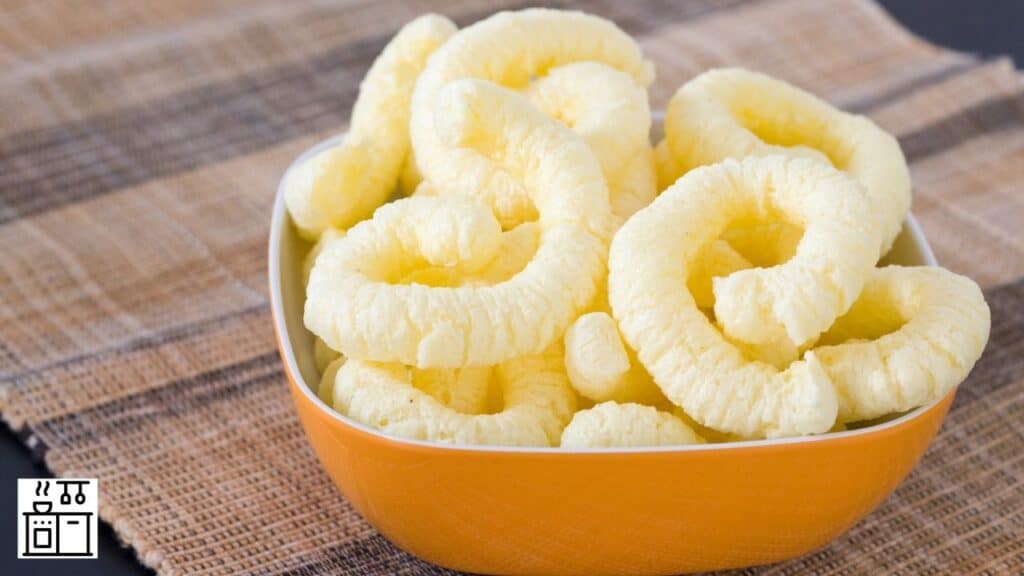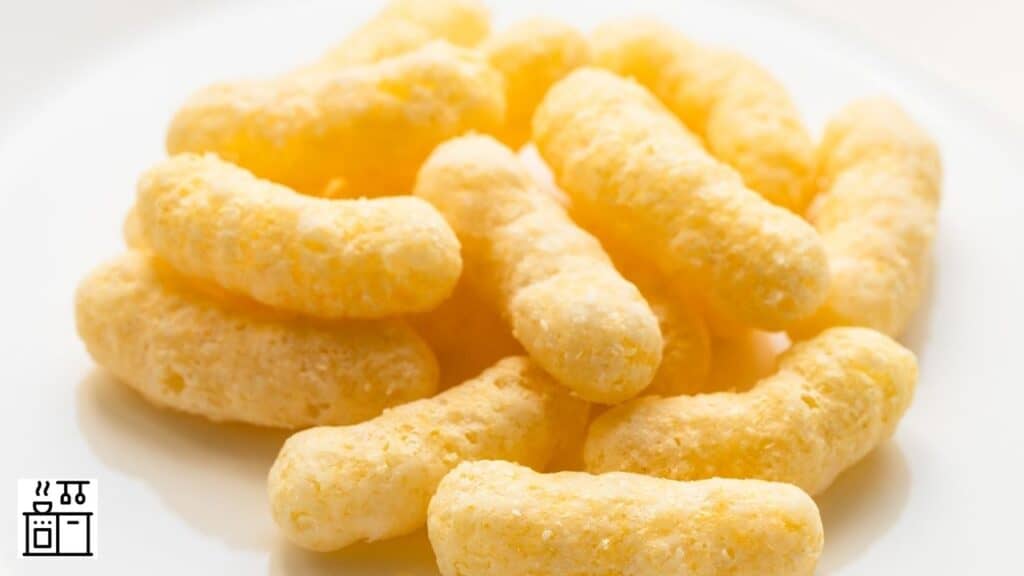Corn puffs are one the most popular store-bought snacks. Interestingly, it’s primarily formed of a single, simple ingredient, cornmeal, which is transformed into a puffy and crisp snack. So, how are corn puffs made?
Corn puffs are made by loading wet cornmeal in an extruder and transforming it into desired shapes. It’s then passed through a die at high pressure, converting the corn moisture into steam. As the mixture passes through the die, it’s cut into the desired size. The puffs are then dried and flavored.
Let’s now look at this process in closer detail.
The 6-Step Manufacturing Process Of Corn Puffs
Corn puffs look like they’re complex products made using fancy ingredients. However, it’s just the opposite.
This snack has a single main ingredient—corn.
So, how is a simple ear of corn converted into a fluffy puff?
We can credit the manufacturing process for the complex form and delicious texture of this snack item.
Corn puffs are made in an extruding machine.
Extrusion is a thermodynamic process that alters the temperature, pressure, and moisture levels of the ingredients to produce this snack.
We can break down the entire manufacturing process into the following essential steps.
1. Preparing the ingredients.
Corn puffs begin with plain cornmeal.
Cornmeal is mixed with little water to create a thick paste that is loaded into an extrusion machine.
The extrusion machine transforms the wet paste into corn puff shapes.
2. Puffing the cornmeal mix to make corn puffs.
The puff-shaped corn is passed through a die and exposed to high pressure.
The die is set to the right temperature, at which the moisture in the cornmeal mix quickly transforms into steam.
During this process, air cells form inside the corn puff. This makes it rise and develop a puffy shape.
3. Cutting the corn puffs into size.
Once the corn puffs expand and achieve the desired texture and size, it’s simply a matter of cutting them to the correct size.
A rotating knife or blade cuts the corn puffs to the correct size as they emerge from the die.
This shape and size can be customized as per requirement by adjusting the shape of the exit through which the puffs appear.
So, you can have corn puffs that are circular, cylindrical, or angular.
At this stage, the corn puffs are of the right size and shape. However, their texture is still not right.
Recommended: Do You Need To Refrigerate Corn Tortillas? | Does A Cornbread Have Corn? | Where Do Granny Smith Apples Grow?
4. Drying the corn puffs.
After cutting the corn puffs to shape, the next stage is drying them.
The puffs are transferred to a drying oven to get rid of excess moisture.
The corn puffs that come out of the oven will be crispy and dry.
5. Adding flavors to the corn puffs.
Just like we season regular popcorn after popping the corn kernels, flavoring agents are added to the corn puffs only after the drying process.
Commonly used flavors are salt, caramel, toffee, and coconut.
The corn puffs are coated in these flavors after they’re completely dry.
The flavoring agent will usually be in a liquid form.
The puffs are rolled in the liquid, and the flavoring agents form a crust on the surface.
Once the corn puffs have this flavor coating, it’s time to separate them.
The coating on the corn puffs thickens and hardens in a few minutes.
When the corn puffs reach room temperature, they’re packed into bags.
6. Packaging corn puffs.
Corn puffs are ready for packaging once their flavor coating is dry.
The flavored corn puffs are separated into batches.
They’re measured, separated, and grouped into production packages.
Most manufacturers use tube-shaped plastic or aluminum wrap to seal the corn puffs.
Most corn puffs factories use form and fill stations to pack and seal the puffs.
This machine heats both ends of the tube, turning it into a bag-like shape.
After measuring and weighing the desired amount of corn puffs into the bags, the tube-shaped bags are cut and separated.
They’re finally shipped off in standard palettes to their final destinations.
Benefits Of Corn Puffs Over Other Snacks

One of the most interesting things about corn puffs is that they’re not deep-fried snacks.
They’re manufactured through an extrusion process, which doesn’t use any oil.
Since these snacks don’t contain significant amounts of oil, they’re generally great.
However, the exact nutritional profile will depend on the flavors used.
Corn puffs have the following significant advantages over normal snacks.
- They don’t carry oil because they’re roasted, not fried.
- They contain no artificial flavors or preservatives.
- Since corn puffs don’t use egg or other animal-based products, they’re suitable for vegetarians.
Can You Make Corn Puffs At Home?
The traditional way of making corn puffs is by passing them through an extrusion machine.
However, you can also make this snack at home.
To prepare corn puffs at home, you will need a few more ingredients than what is used to manufacture them commercially.
These ingredients include baking powder, flour, salt, and water.
To begin the process, heat oil in a pot to a high temperature.
The next step is to prepare the wet and dry ingredients separately.
Once the dry ingredient mix is ready, make a hole in the center and pour the wet ingredients into it.
Mix it and add the corn kernels into the fritter batter.
Drop spoons of the batter into hot oil and wait for it to cook till it’s golden brown.
You can even use different tools to create different shapes. Once you fry the batter, drain it on a paper towel.
Add flavoring and seasoning agents to the corn puffs while they’re still warm.
You can use sweet or savory seasonings like salt, cheese, butter, and herbs.
Adding such flavoring agents will enhance the taste of the corn puffs and make them more delicious.
The main difference between these corn puffs and those available on the market is that the homemade version is deep-fried.
The original version is made from popped corn kernels.
They don’t use oil and are better because they contain fewer calories and less oil.
Related: Does A Baking Pan Has Teflon? | Does A Copper Pan Has Teflon?
How Are Corn Puffs Different From Popcorn?
Technically, corn puffs and popcorn are made using the same primary ingredient—corn.
However, they use different versions of the same ingredient as the starting material.
Popcorn is made by popping corn kernels.
Meanwhile, corn puffs start as cornmeal mixed with suitable amounts of water.
You can make popcorn in a dedicated popcorn machine, microwave oven, or even on the stovetop.
Meanwhile, authentic corn puffs are made in extrusion machines.
The nutritional profile and health benefits of traditional popcorn will depend on whether it’s air-popped or oil-popped.
It will also vary according to the flavors used.
Meanwhile, corn puffs use little to no oil.
The flavoring agents also seldom involve butter, oil, or other calorie-dense ingredients.
So, corn puffs are not entirely bad.
They’re better than other deep-fried or oily snacks that contain several calories.

